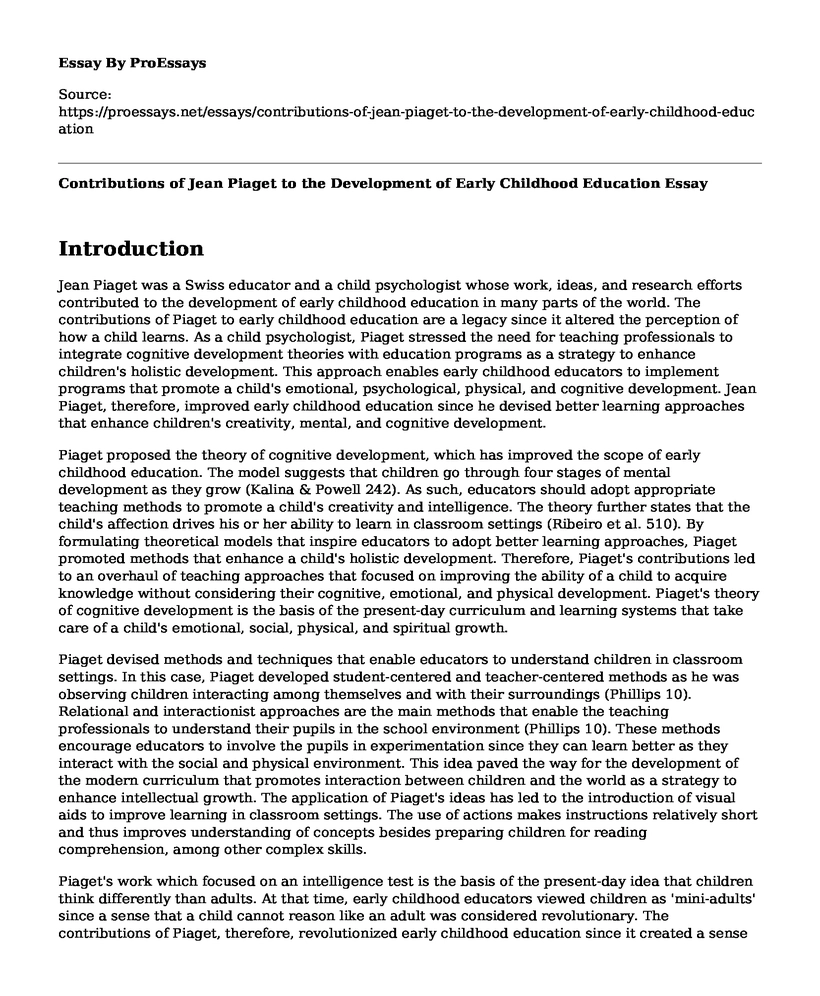Introduction
Jean Piaget was a Swiss educator and a child psychologist whose work, ideas, and research efforts contributed to the development of early childhood education in many parts of the world. The contributions of Piaget to early childhood education are a legacy since it altered the perception of how a child learns. As a child psychologist, Piaget stressed the need for teaching professionals to integrate cognitive development theories with education programs as a strategy to enhance children's holistic development. This approach enables early childhood educators to implement programs that promote a child's emotional, psychological, physical, and cognitive development. Jean Piaget, therefore, improved early childhood education since he devised better learning approaches that enhance children's creativity, mental, and cognitive development.
Piaget proposed the theory of cognitive development, which has improved the scope of early childhood education. The model suggests that children go through four stages of mental development as they grow (Kalina & Powell 242). As such, educators should adopt appropriate teaching methods to promote a child's creativity and intelligence. The theory further states that the child's affection drives his or her ability to learn in classroom settings (Ribeiro et al. 510). By formulating theoretical models that inspire educators to adopt better learning approaches, Piaget promoted methods that enhance a child's holistic development. Therefore, Piaget's contributions led to an overhaul of teaching approaches that focused on improving the ability of a child to acquire knowledge without considering their cognitive, emotional, and physical development. Piaget's theory of cognitive development is the basis of the present-day curriculum and learning systems that take care of a child's emotional, social, physical, and spiritual growth.
Piaget devised methods and techniques that enable educators to understand children in classroom settings. In this case, Piaget developed student-centered and teacher-centered methods as he was observing children interacting among themselves and with their surroundings (Phillips 10). Relational and interactionist approaches are the main methods that enable the teaching professionals to understand their pupils in the school environment (Phillips 10). These methods encourage educators to involve the pupils in experimentation since they can learn better as they interact with the social and physical environment. This idea paved the way for the development of the modern curriculum that promotes interaction between children and the world as a strategy to enhance intellectual growth. The application of Piaget's ideas has led to the introduction of visual aids to improve learning in classroom settings. The use of actions makes instructions relatively short and thus improves understanding of concepts besides preparing children for reading comprehension, among other complex skills.
Piaget's work which focused on an intelligence test is the basis of the present-day idea that children think differently than adults. At that time, early childhood educators viewed children as 'mini-adults' since a sense that a child cannot reason like an adult was considered revolutionary. The contributions of Piaget, therefore, revolutionized early childhood education since it created a sense of understanding that educators should not treat children as 'mini-adults.' In this way, Piaget improved early childhood education by proposing methods that meet children's cognitive development in various stages of their growth.
Conclusion
Conclusively, Jean Piaget is a prominent figure whose contributions revolutionized early childhood education in the early 1990s. Piaget introduced the cognitive development theory that created a sense that a good childhood education program should promote a child's holistic development. As such, Piaget's contributions led to an overhaul of the systems that exclusively focused on a child's intellectual development. His work also improved an understanding that children think differently than adults, and therefore educators should design learning programs based on their capacity to understand the world.
Works Cited
Kalina, Cody, and K. C. Powell. "Cognitive and social constructivism: Developing tools for an effective classroom." Education 130.2 (2009): 241-250, https://docdrop.org/static/drop-pdf/ConstructivismDay1-ln36v.pdf. Accessed 13 September 2019.
Phillips, Denis Charles, ed. Encyclopedia of educational theory and philosophy. Sage Publications, 2014, https://www.researchgate.net/publication/282705581. Accessed 13 September 2019.
Ribeiro Piske, Fernanda Hellen, et al. "Creation Process during Learning of Gifted Students: Contributions from Jean Piaget." Online Submission 8 (2017): 505-513, https://files.eric.ed.gov/fulltext/ED573739.pdf. Accessed 13 September 2019.
Cite this page
Contributions of Jean Piaget to the Development of Early Childhood Education. (2022, Mar 15). Retrieved from https://proessays.net/essays/contributions-of-jean-piaget-to-the-development-of-early-childhood-education
If you are the original author of this essay and no longer wish to have it published on the ProEssays website, please click below to request its removal:
- Effective Learning of the Severely Disabled Students
- Why Abolishment of Examinations in Schools is Necessary
- Personal Statement: Georgetown MS in Mathematics and Statistics
- Essay Sample on School Improvement: High School That Work Program
- Activity Boards: Ideal Toys for Babies in Piaget's Stage - Essay Sample
- Essay Example on Child Development: A Holistic Perspective
- Racism in US Schools: An Increasing Issue - Essay Sample







